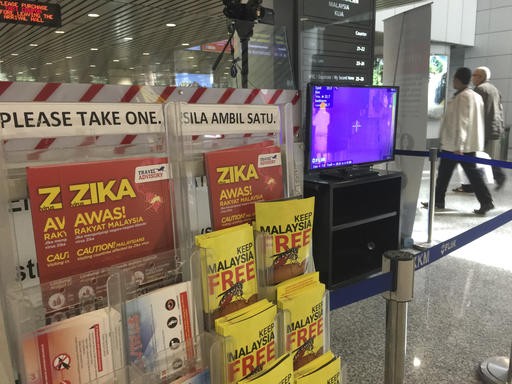Big jump in number of Zika cases in Thailand
Change text size
Gift Premium Articles
to Anyone
 People walk past a travel advisory on the Zika virus infection in Kuala Lumpur International Airport in Sepang, Malaysia on Aug. 28. According to local reports, Singapore Ministry of Health (MOH) and National Environment Agency informed a Malaysian woman living in Singapore became the first patient to be infected by locally-transmitted Zika virus. (AP/Vincent Thian)
People walk past a travel advisory on the Zika virus infection in Kuala Lumpur International Airport in Sepang, Malaysia on Aug. 28. According to local reports, Singapore Ministry of Health (MOH) and National Environment Agency informed a Malaysian woman living in Singapore became the first patient to be infected by locally-transmitted Zika virus. (AP/Vincent Thian)
T
he number of detected Zika infections in Thailand has jumped significantly this year compared to recent years. Between 2012 and 2015, an average of just five people were recorded as infected with the Zika virus each year.
But in the first six months of this year, at least 97 people in Thailand have been diagnosed with the disease. And over the past week, new infections have been detected in Chiang Mai, Chanthaburi, Phetchabun and Bung Kan provinces.
But Spread is Under Control
Disease Control Department chief Dr Amnuay Gajeena, however, sought to allay concerns on Monday about the Zika threat in the country.
“We have implemented the strictest measures in controlling the spread of the Zika virus,” he said.
Amnuay added that Thailand had not seen the prolonged spread of the disease in any affected area and the number of patients was not overwhelming.
He was speaking in response to reports that the European Centre for Disease Prevention and Control (ECDC) has described Thailand as a “red alert” country with increasing or widespread Zika virus transmissions.
Amnuay said on MOnday more Zika cases might have been detected because a better monitoring and diagnostic system had been established.
“Today, we can identify the Zika virus in local labs. We don’t have to submit samples to foreign labs for test results anymore,” he said.
He urged agencies from all sectors to support the Public Health Ministry’s efforts to combat the virus.
“As soon as a Zika case is detected, we have to set up an emergency operations centre to control the spread at both the provincial and district levels,” he said.
While Zika usually causes a mild fever, skin rash, conjunctivitis, muscle and joint pain, malaise, or a headache, it can be fatal in severe cases.
Recent scientific evidence has also linked the virus to microcephaly in foetuses and Guillain-Barre syndrome.
“Pregnant women must seek prenatal care. If they develop any suspicious symptoms, they must immediately tell doctors,” Amnuay said.
He said authorities had been monitoring 20 pregnant women in areas where Zika virus cases had been reported. Six have already given birth to healthy babies, he said.
Amnuay added that authorities were also looking into microcephaly cases in Thailand to determine if there were links to Zika infections.
Relevant authorities, meanwhile, are pushing for the eradication of the breeding grounds of the Aedes aegypti mosquito, which is the vector of the virus.
“Because of mosquitoes, it’s quite hard to eradicate Zika virus once and for all,” Chiang Mai’s public health chief Dr Paisal Thanyawinichkul said.
He said Chiang Mai province had detected its seventh patient in San Kamphaeng district – the same area where two cases were identified in June.
Chanthaburi Governor Viturach Srinam said eight people came down with Zika infections in the province this year but they had fully recovered already.






